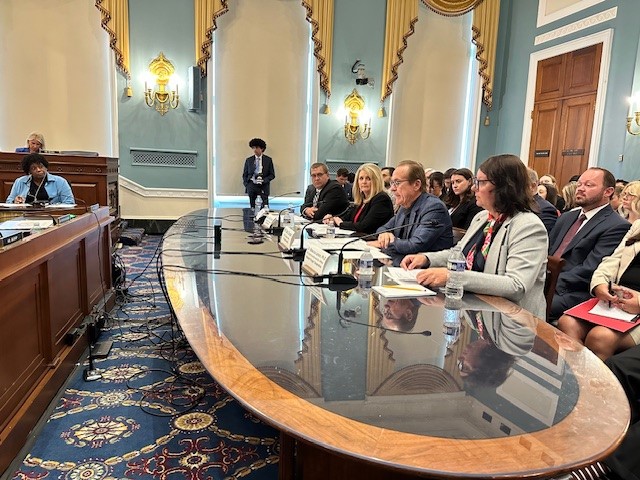Capital Update – For the Week Ending July 12, 2024
In this week’s National Pork Producers Council (NPPC) Friday recap: Pork priorities included in House Appropriations-approved fiscal 2025 ag funding bill; Ohio pork producer alerts Congress of EPA policies affecting agriculture; NPPC weighs in on antimicrobial resistance comments; NPPC’s Johnson highlights pork’s Codex priorities with Caribbean nations; NPPC highlights policy priorities at 2024 National Pork Industry Conference; groups request White House meeting to discuss U.S. trade policy; and U.S. pork exports on pace for good year in 2024. Take a deeper dive below.
Pork Priorities Included in House Appropriations-Approved Fiscal 2025 Ag Funding Bill | Ohio Pork Producer Alerts Congress of EPA Policies Affecting Agriculture | NPPC Weighs in on Antimicrobial Resistance Comments | NPPC’s Johnson Highlights Pork’s Codex Priorities with Caribbean Nations | NPPC Highlights Policy Priorities at 2024 National Pork Industry Conference | Groups Request White House Meeting to Discuss U.S. Trade Policy | U.S. Pork Exports on Pace for Good Year in 2024
Pork Priorities Included in House Appropriations-Approved Fiscal 2025 Ag Funding Bill
What happened: The House Appropriations Committee this week approved a fiscal 2025 funding bill for the U.S. Department of Agriculture, the Food and Drug Administration, and related agencies that includes several provisions advocated by NPPC.
Among NPPC priority agricultural issues addressed in the nearly $26 billion spending legislation are ones that would:
- Fund programs related to preparing for and preventing foreign animal diseases (FADs), including for the National Animal Health Laboratory Network, the National Animal Disease Preparedness and Response Program, the National Veterinary Stockpile, and the National Animal Vaccine and Veterinary Countermeasures Bank.
- Block USDA regulations that broaden the scope of the Packers and Stockyards Act (PSA) in ways that could encourage frivolous litigation and change the requirement to show harm to competition.
- Direct FDA to hold a required hearing before removing access to Carbadox, a medication used in growing pig feed to prevent bacterial pathogens causing diarrhea. It has been used for nearly 50 years, and its manufacturer has repeatedly proved the safety of the animal drug.
- Fund the Market Access Program (MAP) and the Foreign Market Development (FMD) program, both of which promote U.S. agricultural exports.
The agriculture appropriations bill, which the committee passed on a 29-26 vote, now goes to the full House of Representatives for a vote.
NPPC’s take: NPPC supports funding in the agriculture appropriations legislation for programs that support producers, including those that improve preparation for and prevention of FADs and help promote U.S. exports. It also supports efforts to block USDA rulemakings under the PSA and the provision requiring a hearing on Carbadox.
Why it matters: The annual agriculture appropriations law funds federal programs that support farmers, including farm loans, agricultural research, and ones related to preventing and preparing for FADs.
Ohio Pork Producer Alerts Congress of EPA Policies Affecting Agriculture
What happened: Gary Cooper, a pork and poultry producer from Ohio, testified on behalf of NPPC at a House Agriculture Committee hearing on the consequences of the U.S. Environmental Protection Agency’s actions on U.S. agriculture.
He told the panel that many of EPA’s rules have thwarted farmers’ efforts to be good stewards of the environment. Cooper cited, among other agency regulations, the proposed Effluent Limitation Guidelines (ELGs) applicable to meat and poultry plants, which could force the closure of smaller facilities, and the Waters of the United States (WOTUS) Rule, which was supposed to protect the nation’s navigable waterways but whose expansive language could regulate dry ditches, ephemeral streams, stock ponds, and other features typically found on farmland.
Cooper did commend EPA’s efforts to work with farmers, including forming the Office of Agricultural and Rural Affairs. OARA, which reports directly to the EPA administrator, serves as the primary liaison between rural and agricultural stakeholders and the agency.
Among others testifying at the hearing was Missouri Department of Agriculture Director Chris Chinn, who formerly served on the NPPC Environment Committee.
Why it matters: Environmental regulations are essential, setting guidelines and limits related to air, land, and water for various sectors, including the pork industry. However, when poorly conceived or implemented, EPA rules can significantly burden to agricultural producers. To help ensure that doesn’t happen, NPPC advocates for practical and affordable measures that solve real and important problems.

Cooper (second from right, speaking) testifies before the House Agriculture Committee.
NPPC Weighs in on Antimicrobial Resistance Comments
What happened: Last Friday, the U.S. Department of Agriculture, with input from NPPC and other animal agriculture organizations, submitted comments on antimicrobial use in food-producing animals to the United Nations for its upcoming high-level meeting on antimicrobial resistance (AMR). The UN will meet in September to review progress on global and national efforts to tackle AMR, which can lead to disease treatment failures in humans.
Among other commitments related to AMR and food animals, the UN is considering a 30% reduction in antimicrobials used by the global agri-food system by 2030. It also wants to eliminate by 2030 the use of medically important antimicrobials for human medicine in animals for non-veterinary medical purposes and in crop production and agri-food systems for non-phytosanitary purposes.
NPPC’s take: NPPC strongly supports antimicrobial stewardship and the production of safe, wholesome protein for consumers. It has cautioned against relying on antibiotic use data to establish causality for antimicrobial resistance in human illnesses. NPPC does not support antimicrobial performance standards, which could negatively affect animal health and welfare.
Why it matters: Antimicrobial products are used to maintain animal health and well-being and to produce safe food. Producers and veterinarians collect use data to help them make informed decisions on appropriate interventions and treatments.
NPPC’s Johnson Highlights Pork’s Codex Priorities with Caribbean Nations
What happened: NPPC Director of Food Policy Dr. Ashley Johnson participated on a panel presenting to Caribbean nation representatives to the U.N.’s Codex Alimentarius Commission, the international food safety standards-setting body.
Representing the Food Industry Codex Coalition (FICC), Johnson discussed the food industry’s strategic priorities of the various Codex committees on which FICC members serve. Having recently attended a meeting of the Codex Commission on Contaminants in Food, Johnson focused her comments on that topic.
The FICC consists of more than 70 U.S. food and beverage companies and trade associations, including NPPC. It represents the entire food chain and advocates for international food standards and policies based on science.
NPPC’s take: NPPC supports the work of the Codex Commission, which provides the U.S. pork industry opportunities to engage on standards affecting food safety, food production, and international trade. NPPC also collaborates with food and agriculture groups in several countries, including the Caribbean nations, to gather consensus on the commission’s standards and guidelines.
Why it matters: The Codex Commission helps protect the health of consumers, facilitate international trade, and ensure fair practices in international food trade. Standards adopted by the commission have wide-ranging applications, as they are used throughout international trade negotiations as baselines for trade text.
NPPC Highlights Policy Priorities at 2024 National Pork Industry Conference
What happened: Pork producers and allied industries across the value chain gathered at the Kalahari Resort in Wisconsin Dells, WI, for the 28th annual National Pork Industry Conference (NPIC). More than 900 attendees participated in various seminars covering biosecurity, sow and nursery production, animal traceability, industry financial health, and policy topics. NPPC is a lead sponsor of the event, which is produced and hosted by 21st Century Strategic Forums, L.L.C.
NPPC Vice President and Iowa producer Rob Brenneman, as well as NPPC board member and Ohio producer Pat Hord, provided attendees with insights on sustainability and animal housing.
NPPC CEO Bryan Humphreys discussed animal health, workforce issues, trade, and industry advocacy efforts, while underscoring NPPC’s 2024 policy wins to date. Humphreys, Vice President of Government Affairs Maria C. Zieba, Senior Director of Congressional Relations Matt Grill, Director of Animal Health Dr. Anna Forseth, and Director of State Policy Drew Beardslee participated in a Q and A session on policy priorities for the pork industry, including the 2024 Farm Bill, California Proposition 12 and Massachusetts Question 3, international trade issues, and foreign animal disease prevention and preparedness.
During the meeting, former NPPC CEO Neil Dierks was honored with the NPIC Larry Graham Pork Legacy Award for his more than 20 years of service to the pork industry. (Read about Dierks’ contributions here.) The award is named after NPIC founder Larry Graham, who, along with his wife Jean, started the conference in 1996.
Why it matters: Industry conferences such as NPIC serve as a platform for NPPC to raise awareness and educate pork industry stakeholders about the current public policy issues and challenges facing pork producers and how they can get involved.

NPPC Vice President and Iowa producer Rob Brenneman speaks to NPIC attendees on maintaining resilience in the pork industry.
NPPC staff panel answers questions from producers on a variety of topics.

Groups Request White House Meeting to Discuss U.S. Trade Policy
What happened: NPPC joined 45 other agricultural and business organizations in requesting a White House meeting with the directors of the National Security Council (NSC) and the National Economic Council (NEC) to discuss “advancing our nation’s economy and national security through a positive and proactive U.S. trade policy that benefits all U.S. enterprises and citizens.”
In a July 11 letter to NSC Director Jake Sullivan and NEC Director Lael Brainard, the groups said, “now is the time for the [Biden] Administration to chart a course for future U.S. trade policy that includes commercially meaningful negotiations on two-way trade with U.S. allies and partners.”
The organizations offered several recommendations, including that U.S. trade policy leaders recognize the benefits of negotiating preferential trade agreements. They said U.S. trade policy should incentivize U.S. companies to invest and expand their U.S. operations and workforces and ensure U.S. agricultural producers can compete on a level playing field in export markets. They also called for policy that strengthens U.S. workforce competitiveness in the international marketplace.
The groups pointed out that, despite the clear benefits of trade agreements, “negotiations have stalled in recent years, while other countries continue to establish the global rules of the road without U.S. participation.”
NPPC’s take: NPPC has been urging the Biden administration to open new and expand existing markets for U.S. pork through comprehensive trade agreements that eliminate tariff and non-tariff barriers to American products.
Why it matters: U.S. agricultural trade is vital to America’s farmers and the overall U.S. economy. U.S. pork industry exports contribute significantly to producers’ bottom line. Last year, when producers shipped $8.16 billion of product to foreign destinations – a record – those exports added the equivalent of $63.76 to the price they received for each hog marketed.
U.S. Pork Exports on Pace for Good Year in 2024
What happened: Although pork exports in May were down slightly from a year ago – lower 4% in volume and 2% in value – through the first five months of the year, they were 6% higher in volume and 7% in value compared with 2023’s record pace over the same period. They topped 1.29 million metric tons (MT) and $3.6 billion, according to data from the U.S. Department of Agriculture compiled by the U.S. Meat Export Federation.
Mexico continued to be the No. 1 export market for U.S. pork, with volume in May of more than 91,000 MT and value at nearly $202 million. While volume was down 6% from a year ago, value was up more than 1%. January-May exports were more than 480,000 MT, up 7% from a year ago, while value rose 14% to $1.02 billion.
Other markets that saw strong export growth in May were South Korea, which took 22,354 MT worth almost $79 million. That was 6% and 8% higher than a year ago. Year to date through May, exports to the Asian nation were 35% above last year’s pace and value was up 40% to $395.4 million. May pork exports to Central America increased 11% from a year ago and value jumped 26%. For the first five months of 2024, exports increased from the same period a year ago by 25% in volume and 35% in value, rising to nearly $197 million.
May exports to Australia and New Zealand were down slightly from a year ago, but for the January-May period, they were up 64% in volume and 63% in value, climbing to $165.6 million. The Philippines, Malaysia, and Vietnam took exports for the first five months of the year of 31,715 MT valued at $62.7 million, increases over the same period last year of 17% and 4%, respectively. Pork exports to Colombia were strong in May, climbing 55% from a year ago to 9,653 MT, while value soared 63% to $26.6 million. January-May exports increased 46% in volume and 58% in value to $135.3 million.
Why it matters: The total value of pork and variety meat exports in May equated to an average of $67.64 in value from each hog that was marketed, while the January-May average was $66.54, up 5% from the same period a year ago. Exports accounted for 25.7% of total carcass weight production in May and 26.0% of production for the first five months of 2024.